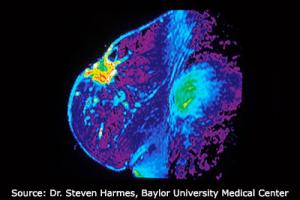
The Consortium for Imaging and Biomarkers (CIB) seeks to improve cancer screening, early detection of aggressive cancer, assessment of cancer risk, and cancer diagnosis by integrating imaging strategies with biomarkers into complementary approaches.
On This Page
- All Heading 2s will automatically be pulled in to this list.
- Do not edit the content on this template.
About CIB
The Consortium for Imaging and Biomarkers aims to integrate imaging strategies and biomarker methodologies into a singular complementary approach to cancer detection. Investigators Work in multi-disciplinary teams to perform collaborative studies, exchange information, share knowledge and leverage common resources.
Overdiagnosis (finding cancers that will never affect a person’s health) and false positives (test results that show cancer when none is there) present significant clinical problems in the prevention, detection and treatment of cancer. There is a need to more accurately identify early-stage aggressive cancers and distinguish lesions that are life threatening from those that are not.
The Consortium for imaging and Biomarkers Research Units develop, optimize, and clinically validate novel methods to:
- Detect aggressive cancers at the earliest stages possible;
- Reduce overdiagnosis;
- Reduce false positive tests; and
- Identify lethal cancers from non-lethal disease.
The goal of the Consortium for imaging and Biomarkers is to develop improved methods for the early detection of aggressive cancer by managing overdiagnosis, reducing false positives and identifying lethal cancers from non-lethal disease using strategies aimed at effective integration and validation of imaging and biomarkers.
Funding Opportunities
No matching Funding Opportunities were found.
Grantee Details
Program Contact(s)
Sudhir Srivastava, Ph.D., M.P.H.
Email: sudhir.srivastava@nih.gov
Guillermo Marquez, Ph.D.
Email: guillermo.marquez@nih.gov
